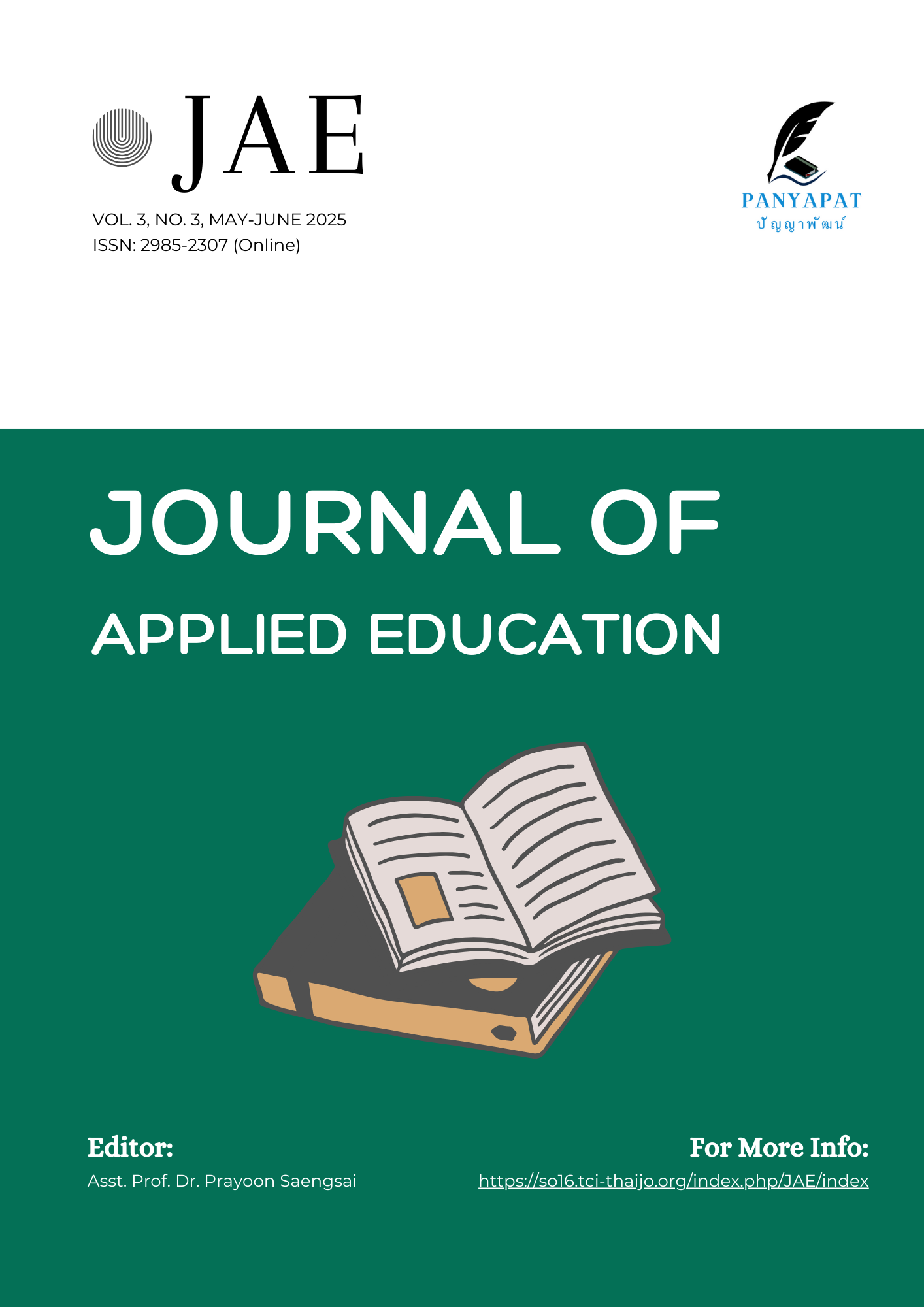The Results of Organizing Learning Activities on Buddhist Principles Using Problem-Based Learning (PBL) With Board Games on Academic Achievement and Creative Problem-Solving Skills of Grade 7 Students
Main Article Content
Abstract
This research aimed to (1) compare students' learning achievement and creative problem-solving skills of students before and after participating in problem-based learning (PBL) integrated with board games, (2) compare the post-learning achievement and creative problem-solving skills between students who experienced problem-based learning with board games and those who received traditional instruction, and (3) investigate students’ satisfaction levels toward problem-based learning integrated with board games. The sample consisted of 60 seventh-grade students enrolled in the first semester of the 2024 academic year at Harnthao Rangsiprachasan School. The participants were chosen through cluster random sampling and assigned to either an experimental group or a control group. The research instruments consisted of (1) lesson plans integrating problem-based learning with board games, (2) traditional teaching lesson plans, (3) an achievement test, (4) a creative problem-solving skills evaluation tool, and (5) a student satisfaction survey. The data analysis employed descriptive statistics including mean (M) and standard deviation (SD), as well as dependent and independent t-tests for comparative analysis. The Findings are as follows: 1) Students who experienced problem-based learning (PBL) integrated with board games demonstrated significantly higher achievement and creative problem-solving skills after the intervention compared to their pre-intervention scores at the .05 significance level. 2) Students in the problem-based learning group with board games achieved significantly higher scores in both learning achievement and creative problem-solving skills compared to those who received traditional instruction, with statistical significance at the .05 level. 3) Students expressed the highest level of satisfaction toward the problem-based learning approach integrated with board games.
Article Details

This work is licensed under a Creative Commons Attribution-NonCommercial-NoDerivatives 4.0 International License.
References
เกศทิพย์ ศุภวานิช. (2564). สพฐ. ย้ำไม่ตัดวิชาพระพุทธศาสนาและศาสนาต่าง ๆ ในหลักสูตรการศึกษาพร้อมแจงให้ความสำคัญทุกศาสนาเสมอมา. สืบค้นจาก https://www.obec.go.th.
จิระวัฒน์ โรจนศิลป์, สามารถ สุขุประการ และ ศิริโรจน์ นามเสนา. (2566). รูปแบบการจัดการเรียนการสอนวิชาพระพุทธศาสนา. วารสารสังคมศาสตร์และวัฒนธรรม, 7(6), 262-271.
ปาริฉัตร โพธิ์คำ, เชษฐภูมิ วรรณไพศาล และ ชรินทร์ มั่งคั่ง. (2564). การจัดการเรียนรู้แบบใช้ปัญหาเป็นฐาน เรื่องสถานการณ์ของโลกในศตวรรษที่ 21 เพื่อส่งเสริมทักษะการคิดแก้ปัญหาของนักเรียนโรงเรียนอัสสัมชัญลำปาง. วารสารวิทยาลัยสงฆ์นครลำปาง, 10(1), 101–113.
ปาริชาต ชิ้นเจริญ. (2564). การพัฒนากิจกรรมการเรียนรู้โดยใช้บอร์ดเกมเป็นฐานที่ส่งเสริมความฉลาดรู้ด้านระบบนิเวศ สำหรับนักเรียนชั้นมัธยมศึกษาปีที่ 4. (การศึกษามหาบัณฑิต, มหาวิทยาลัยนเรศวร).
มนตรี เฉกเพลงพิน. (2561). การศึกษาผลสัมฤทธิ์ทางการเรียนสาระเศรษฐศาสตร์และความสามารถในการคิดอย่างมีเหตุผลของนักเรียนมัธยมศึกษาปีที่ 5 ด้วยการจัดการเรียนรู้โดยใช้ปัญหาเป็นฐานร่วมกับเทคนิค Think-Pair-Share. (ศึกษาศาสตรมหาบัณฑิต, มหาวิทยาลัยศิลปากร).
วทัญญู สุวรรณประทีป. (2559). การพัฒนารูปแบบการจัดการเรียนรู้โดยใช้กรณีศึกษาเป็นฐานร่วมกับปัญหาเป็นฐานและแนวคิดห้องเรียนกลับด้าน เพื่อเสริมสร้างความสามารถในการแก้ปัญหาอย่างสร้างสรรค์สำหรับนักเรียนชั้นมัธยมศึกษาปีที่ 4. (ครุศาสตรมหาบัณฑิต, มหาวิทยาลัยศิลปากร).
วารุณี ชุมตรีนอก, นวลจิตต์ เชาวกีรติพงศ์ และ ทวีศักดิ์ จินดานุรักษ์. (2564). ผลการจัดการเรียนรู้โดยใช้ปัญหาเป็นฐานที่มีต่อผลสัมฤทธิ์ทางการเรียนวิชาวิทยาศาสตร์ เรื่อง แรงและการเคลื่อนที่ และความสามารถในการคิดแก้ปัญหาทางวิทยาศาสตร์ของนักเรียนชั้นมัธยมศึกษาปีที่ 2 โรงเรียนพระมารดานิจจานุเคราะห์ กรุงเทพมหานคร. วารสารศึกษาศาสตร์ปริทัศน์, 36(2), 114-126.
ศรันย์ นินทนาวงศา. (2561). ผลการจัดการเรียนรู้โดยใช้เว็บเควสท์ที่มีต่อผลสัมฤทธิ์ทางการเรียนวิชาสังคมศึกษาและคุณลักษณะใฝ่เรียนรู้ ของนักเรียนระดับชั้นมัธยมศึกษาปีที่ 6. (ศึกษาศาสตรมหาบัณฑิต, มหาวิทยาลัยรามคำแหง).
สถาบันส่งเสริมการสอนวิทยาศาสตร์และเทคโนโลยี (สสวท.). (2565). การประเมินความคิดสร้างสรรค์ของ PISA 2022. กรุงเทพฯ: สถาบันส่งเสริมการสอนวิทยาศาสตร์และเทคโนโลยี.
สำนักเลขาธิการคณะรัฐมนตรี. (2562). พระราชบัญญัติการศึกษาแห่งชาติ (ฉบับที่ 4) พ.ศ. 2562. https://www.ratchakitcha.soc.go.th/DATA/PDF/2562/A/057/T_0049.PDF.
สุดารัตน์ สุทธิวงศ์. (2563). ผลการจัดกิจกรรมการเรียนรู้โดยใช้ปัญหาเป็นฐานที่มีต่อผลสัมฤทธิ์ทางการเรียนคณิตศาสตร์และความสามารถในการแก้ปัญหาทางคณิตศาสตร์ เรื่อง พีระมิด กรวย และทรงกลม ของนักเรียนชั้นมัธยมศึกษาปีที่ 3 โรงเรียนคำยางพิทยา จังหวัดอุดรธานี. (ศึกษาศาสตรมหาบัณฑิต, มหาวิทยาลัยสุโขทัยธรรมาธิราช).
อัจฉราภรณ์ อัศวภูมิ. (2566). การพัฒนาความสามารถในการแก้ปัญหาทางคณิตศาสตร์เรื่อง การบวก การลบ การคูณ และการหาร โดยใช้การจัดการเรียนรู้แบบใช้ปัญหาเป็นฐาน (PBL) ร่วมกับเกมกระดาน สำหรับนักเรียนชั้นประถมศึกษาปีที่ 2. (วิทยาศาสตรมหาบัณฑิต, มหาวิทยาลัยมหาสารคาม).
Barrows, H. S., & Tamblyn, R. M. (1980). Problem-based learning: An approach to medical education (Vol. 1). New York: Springer Publishing Company.
Jonassen, D. H. (2011). Learning to Solve Problems: A Handbook for Designing Problem-Solving Learning Environments. New York: Routledge.
Tang, S., Hanneghan, M., & El Rhalibi, A. (2009). Introduction to games-based learning. International Journal of Game-Based Learning, 1(1), 1-11.

